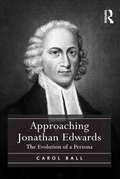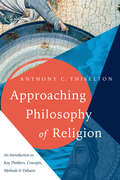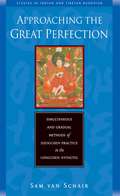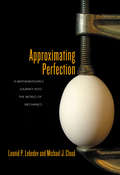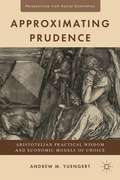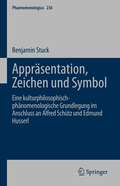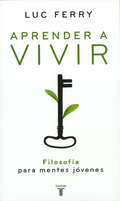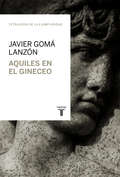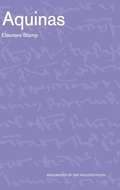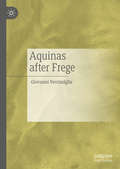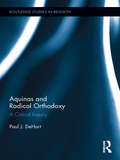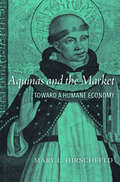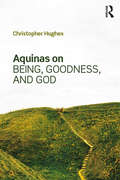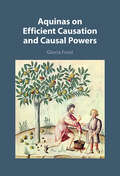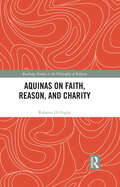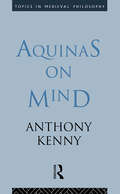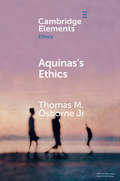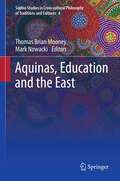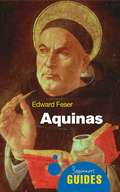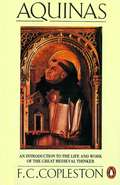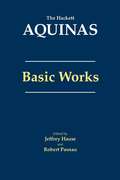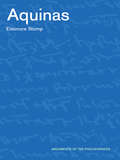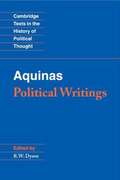- Table View
- List View
Approaching Jonathan Edwards: The Evolution of a Persona
by Carol BallExploring the inner motivations of one of America’s greatest religious thinkers, this book analyses the ways in which Jonathan Edwards' intense personal piety and deep experience of divine sovereignty drove an introverted intellectual along a course that would eventually develop into a mature and respected public intellectual. Throughout his life, the tension between his innately contemplative nature and the active demands of public office was a constant source of internal and public strife for Edwards. Approaching Jonathan Edwards offers a new theoretical approach to the study of Edwards, with an emphasis on his writing activity as the key strategy in shaping his legacy. Tracing Edwards’ strategic self-fashioning of his persona through the many conflicts in which he was engaged, the critical turning points in his life, and his strategies for managing conflicts and crises, Carol Ball concludes that Edwards found his place as a superlative contemplative apologist and theorist of experiential spirituality.
Approaching Philosophy of Religion: An Introduction to Key Thinkers, Concepts, Methods and Debates
by Anthony C. ThiseltonApproaching Philosophy of ReligionApproaching Philosophy of Religion
Approaching the Great Perfection
by Sam Van SchaikDzogchen, the Great Perfection, is the highest meditative practice of the Nyingma School of Tibetan Buddhism. Approaching the Great Perfection looks at a seminal figure of this lineage, Jigme Lingpa, an eighteenth-century scholar and meditation master whose cycle of teachings, the Longchen Nyingtig, has been handed down through generations as a complete path to enlightenment. Ten of Jigme Lingpa's texts are presented here, along with extensive analysis by van Schaik of a core tension within Buddhism: Does enlightenment develop gradually, or does it come all at once? Though these two positions are often portrayed by modern scholars as entrenched polemical views, van Schaik explains that both tendencies are present within each of the Tibetan Buddhist schools. He demonstrates how Jigme Lingpa is a great illustration of this balancing act, using the rhetoric of both sides to propel his students along the path of the Great Perfection.
Approximating Perfection
by Leonid P. Lebedev Michael J. CloudThis is a book for those who enjoy thinking about how and why Nature can be described using mathematical tools. Approximating Perfection considers the background behind mechanics as well as the mathematical ideas that play key roles in mechanical applications. Concentrating on the models of applied mechanics, the book engages the reader in the types of nuts-and-bolts considerations that are normally avoided in formal engineering courses: how and why models remain imperfect, and the factors that motivated their development. The opening chapter reviews and reconsiders the basics of calculus from a fully applied point of view; subsequent chapters explore selected topics from solid mechanics, hydrodynamics, and the natural sciences. Emphasis is placed on the logic that underlies modeling in mechanics and the many surprising parallels that exist between seemingly diverse areas. The mathematical demands on the reader are kept to a minimum, so the book will appeal to a wide technical audience.
Approximating Prudence
by Andrew M. YuengertIn a unique undertaking, Andrew Yuengert explores and describes the limits to the economic model of the human being, providing an alternative account of human choice, to which economic models can be compared.
Appräsentation, Zeichen und Symbol: Eine kulturphilosophisch-phänomenologische Grundlegung im Anschluss an Alfred Schütz und Edmund Husserl (Phaenomenologica #236)
by Benjamin StuckAppräsentation gehört zu den Schlüsselkonzepten im Werk des Philosophen und Begründers der Phänomenologie Edmund Husserl (1859–1938) und des ihm nachfolgenden Alfred Schütz (1899–1959). In dem Buch bringt der Autor die Ergebnisse ihrer lebenswelttheoretischen Forschung zusammen und systematisiert ihre Überlegungen zur Appräsentation – dem Mitgegebensein von etwas, das eigentlich nicht da ist. Dies nimmt er zum Ausgangspunkt, um sich mit der kulturphilosophischen These auseinanderzusetzen, nach der menschliche Erfahrung kulturell geprägt ist. Das Erklärungspotenzial der transzendentalphänomenologischen Tradition Husserls und der mundanphänomenologischen Tradition von Schütz demonstriert der Autor an zwei Beispielen aus der Kulturphilosophie und der Kultursoziologie. Was leistet also das Konzept der Appräsentation im Detail und wie kann es helfen kulturelle Sinnkonstitution zu beschreiben? Um diese Frage zu beantworten, wird im ersten Teil des Werks zunächst die Phänomenologie an die Logik der Kulturwissenschaften angeknüpft, um dann die Bedeutung appräsentativer Beziehungen bei Husserl zu klären – beispielsweise für das Bewusstsein von Zeit, der Horizontstruktur von Erfahrungen oder Einfühlung. Im nächsten Schritt legt der Autor den Stellenwert von Appräsentationsbeziehungen im Werk von Schütz offen. Er fragt nach ihren Dimensionen, wie sie in Schütz‘ weit ausdifferenzierten Symbol- und Zeichentheorie zum Ausdruck kommt, anhand derer er Kulturalität und Sozialität phänomenologisch beschreibt. Die Analyse bringt zweierlei hervor: die Bedeutung des appräsentativen Mitdaseins von Erfahrungsaspekten und die komplexe appräsentative Relation von unterschiedlichen Sinnschemata als Grundelement kultureller Sinnsetzung. Diese erste Monographie zum Thema der Appräsentation und der appräsentativen Beziehungen erscheint in der Buchreihe Phaenomenologica. Das Werk richtet sich an Studierende und Forschende aus den Geistes- und Sozialwissenschaften mit Interesse an Phänomenologie, soziologischer Theorie oder Kulturphilosophie.
Aprender a vivir: Filosofía para mentes jóvenes
by Luc FerryPensado para jóvenes y adultos que quieren saber qué es la filosofía y cómo puede esta ayudarnos a vivir mejor y a ser más libres. Voy a contarte la historia de la filosofía. No toda, por supuesto, pero sí sus cinco grandes momentos. Para cada una de estas etapas, te ofreceré como ejemplo una o dos formas de ver el mundo, de modo que puedas empezar a leer por ti mismo, si te apetece, a alguno de sus pensadores. También quiero hacerte una promesa: voy a exponerte todas estas ideas de forma muy clara, sin jerga, yendo a lo esencial, a lo más apasionante que hay en ellas. Si me sigues, acabarás sabiendo de verdad qué es la filosofía y por qué resulta irremplazable a la hora de aclararnos los múltiples interrogantes que se plantean en torno a cómo podemos o debemos vivir nuestras vidas. Aprender a vivir, a dejar de temer los diversos rostros de la muerte o, simplemente, aprender a superar la banalidad de la vida cotidiana, las preocupaciones y el tiempo que pasa, este fue el primer objetivo de las escuelas de la Antigüedad griega. Merece la pena escuchar su mensaje, porque las filosofías del pasado nos siguen hablando.
Apuleius' Platonism
by Richard FletcherApuleius of Madauros, writing in the latter half of the second century CE in Roman North Africa, is best known to us today for his Latin fiction, the Metamorphoses aka The Golden Ass, about a man who turned into a donkey and back again. However, he was also a Platonic philosopher, who, even though many of his writings are lost, wrote a range of rhetorical and philosophical works which survive to this day. This book examines these works to reveal how Apuleius' Platonism is a result of his 'impersonation of philosophy', that is, a rhetorically powerful methodological tool that allows him to 'speak' on behalf of Plato and his philosophy. This book is the first exploration of the full scope of his idiosyncratic brand of Platonism across his multifarious literary corpus and is a major contribution to the study of the dynamic between literature and philosophy in antiquity and beyond.
Aquiles en el Gineceo (Tetralogía de la Ejemplaridad)
by Javier Gomá LanzónAquiles en el gineceo cuenta el proceso subjetivo de formación de la ejemplaridad. Sirviéndose de un mito griego presenta los dos estadios que debe recoger el yo para convertirse en un individuo ejemplar. Aquiles pasó su adolescencia en un gineceo siendo inmortal como un dios y en determinado momento lo abandonó rumbo al campo de batalla de Troya donde sabía que iba a morir. ¿Por qué tomó esta decisión? Elige ser mortal porque la mortalidad es el precio que debe pagar por llegar a ser verdaderamente individual y merecer el título del mejor de los hombres. Todos nosotros recorremos ese mismo camino del gineceo a Troya y, como Aquiles, debemos aprender a ser mortales para ser individuales. Cada uno de los títulos de esta tetralogía es autónomo y de lectura independiente y al mismo tiempo los cuatro forman parte de un plan unitario en torno a la idea de la ejemplaridad: su historia y su teoría general, su formación subjetiva, su aplicación en la esfera política y su relación con la esperanza.
Aquinas
by Eleonore StumpFew philosophers or theologians exerted as much influence on the shape of medieval thought as Thomas Aquinas. He ranks amongst the most famous of the Western philosophers and was responsible for almost single-handedly bringing the philosophy of Aristotle into harmony with Christianity. He was also one of the first philosophers to argue that philosophy and theology could support each other. The shape of metaphysics, theology, and Aristotelian thought today still bears the imprint of Aquinas' work. <p><p> In this extensive and deeply researched study, Eleonore Stump examines Aquinas' major works, Summa Theologiae and Summa Contra Gentiles, and clearly assesses the vast range of Aquinas' thought. Philosophers, theologians, and students of the medieval period alike will find this unrivalled study an indispensable resource in researching and teaching Aquinas.
Aquinas after Frege
by Giovanni VentimigliaThis book provides a fresh reading of Aquinas’ metaphysics in the light of insights from the works of Frege. In particular, Ventimiglia argues that Aquinas’ doctrine of being can be better understood through Frege’s distinction between the ‘there is’ sense and the ‘present actuality’ sense of being, as interpreted by Peter Geach and Anthony Kenny. Aquinas’ notion of essence becomes clearer in the light of Frege’s distinction between objects and concepts and his account of concepts as functions. Aquinas’ doctrine of trancendentals is clarified with the help of Frege’s accounts of assertion and negation. Aquinas after Frege provides us with a new Aquinas, which pays attention to his texts and their historical context. Ventimiglia’s development of ‘British Thomism’ furnishes us with a lucid and exciting re-reading of Aquinas’ metaphysics.
Aquinas and Radical Orthodoxy: A Critical Inquiry (Routledge Studies in Religion)
by Paul DeHartAquinas and Radical Orthodoxy investigates the encounter of the most vibrant and controversial trend in recent theology with the greatest Christian thinker of the Middle Ages. The book describes Radical Orthodoxy’s orientation and highlights those anti-secular strategies and intellectual influences that have shaped its appeal to Aquinas. It surveys the emergence of the particular picture of Aquinas especially associated with the leaders of Radical Orthodoxy, John Milbank and his student Catherine Pickstock, along with the scholarly disputes which prompted and followed that development. The book then undertakes a detailed investigation of the pivotal publications on Aquinas of those two authors, laying out their difficult theories in clear language, carefully examining the texts of Aquinas to which they appeal, and challenging their interpretations on a number of fundamental points. Topics covered include: analogical language and knowledge of God, the role of metaphysics within theology, the relation of cognition to the divine archetypes of things, the possibility of human apprehension of God’s essence, the nature of substance, and speculation on the Trinity. The conclusion reflects on those elements suppressed by the Radical Orthodox reading of Aquinas, their constructive philosophical and theological possibilities, and the challenges they present to the Radical Orthodox project.
Aquinas and the Market: Toward a Humane Economy
by Mary L. HirschfeldEconomists investigate the workings of markets and tend to set ethical questions aside. Theologians often dismiss economics, losing insights into the influence of market incentives on individual behavior. Mary L. Hirschfeld bridges this gap by showing how a humane economy can lead to the good life as outlined in the thought of St. Thomas Aquinas.
Aquinas and the Nicomachean Ethics
by Matthias Perkams Tobias Hoffmann Jörn MüllerAristotle's Nicomachean Ethics is the text which had the single greatest influence on Aquinas's ethical writings, and the historical and philosophical value of Aquinas's appropriation of this text provokes lively debate. In this volume of new essays, thirteen distinguished scholars explore how Aquinas receives, expands on, and transforms Aristotle's insights about the attainability of happiness, the scope of moral virtue, the foundation of morality, and the nature of pleasure. They examine Aquinas's commentary on the Ethics and his theological writings, above all the Summa theologiae. Their essays show Aquinas to be a highly perceptive interpreter, but one who also who also brings certain presuppositions to the Ethics and alters key Aristotelian notions for his own purposes. The result is a rich and nuanced picture of Aquinas's relation to Aristotle that will be of interest to readers in moral philosophy, Aquinas studies, the history of theology, and the history of philosophy.
Aquinas on Being, Goodness, and God
by Christopher HughesThomas Aquinas is one of the most important figures in the history of philosophy and philosophical theology. Relying on a deep understanding of Aristotle, Aquinas developed a metaphysical framework that is comprehensive, detailed, and flexible. Within that framework, he formulated a range of strikingly original and carefully explicated views in areas including natural theology, philosophy of mind, philosophical psychology, and ethics. In this book, Christopher Hughes focuses on Aquinas’s thought from an analytic philosophical perspective. After an overview of Aquinas’s life and works, Hughes discusses Aquinas’s metaphysics, including his conception of substance, matter, and form, and his account of essence and existence; and his theory of the nature of human beings, including his critique of a substance dualism that Aquinas attributes to Plato, but is usually associated with Descartes. In the final chapters, Hughes discusses Aquinas’s account of the existence and nature of God, and his treatment of the problem of evil, as well as his ideas about the relation of goodness to being, choice, and happiness. Aquinas on Being, Goodness, and God is essential reading for students and scholars of Aquinas, and anyone interested in philosophy of religion or the history of medieval philosophy.
Aquinas on Efficient Causation and Causal Powers
by Gloria FrostIn this innovative book, Gloria Frost reconstructs and analyses Aquinas's theories on efficient causation and causal powers, focusing specifically on natural causal powers and efficient causation in nature. Frost presents each element of Aquinas's theories one by one, comparing them with other theories, as well as examining the philosophical and interpretive ambiguities in Aquinas's thought and proposing fresh solutions to conceptual difficulties. Her discussion includes explanations of Aquinas's technical scholastic terminology in jargon-free prose, as well as background on medieval scientific views - including ordinary language explanations of the medieval physical theories which Aquinas assumed in formulating his views on causation and causal powers. The resulting volume is a rich exploration of a central philosophical topic in medieval philosophy and beyond, and will be valuable especially for scholars and advanced students working on Aquinas and on medieval natural philosophy.
Aquinas on Faith, Reason, and Charity (Routledge Studies in the Philosophy of Religion)
by Roberto Di CeglieThis book offers a new reading of Aquinas’ views on faith. The author argues that the theological nature of faith is crucial to Aquinas’ thought, and that it gives rise to a peculiar and otherwise incomprehensible relationship with reason. The first part of the book examines various modern and contemporary accounts of the relationship between faith and reason in Aquinas’ thought. The author shows that these accounts are unconvincing because they exhibit what he calls a Lockean view of faith and reason, which maintains that the relationship in question should only be treated by way of evidence. In other words, this view ignores the specific nature of the Christian faith and the equally specific way it needs to relate to reason. The second part offers a comprehensive account of Aquinas’ view of faith. It focuses on the way the divine grace and charity shape the relationship between evidence and human will. The final part of the book ties these ideas together to show how Christian faith, with its specifically theological nature, is perfectly compatible with rational debates. It also argues that employing the specificity of faith may constitute the best way to promote autonomous and successful rational investigations. Aquinas on Faith, Reason, and Charity will be of interest to scholars and advanced students working on Aquinas, philosophy of religion, Christian theology, and medieval philosophy.
Aquinas on Mind (Topics in Medieval Philosophy)
by Anthony Kenny Sir Anthony KennyThis book shows how the mature writings of Thomas Aquinas though written in the thirteenth century have much to offer the human mind and the relationship between intellect and will, body and soul.
Aquinas's Ethics (Elements in Ethics)
by Thomas M. Osborne JrThis Element provides an account of Thomas Aquinas's moral philosophy that emphasizes the intrinsic connection between happiness and the human good, human virtue, and the precepts of practical reason. Human beings by nature have an end to which they are directed and concerning which they do not deliberate, namely happiness. Humans achieve this end by performing good human acts, which are produced by the intellect and the will, and perfected by the relevant virtues. These virtuous acts require that the agent grasps the relevant moral principles and uses them in particular cases.
Aquinas, Education and the East (Sophia Studies in Cross-cultural Philosophy of Traditions and Cultures #4)
by Mark Nowacki Thomas Brian MooneyA confluence of scholarly interest has resulted in a revival of Thomistic scholarship across the world. Several areas in the investigation of St. Thomas Aquinas, however, remain under-explored. This volume contributes to two of these neglected areas. First, the volume evaluates the contemporary relevance of St. Thomas's views for the philosophy and practice of education. The second area explored involves the intersections of the Angelic Doctor's thought and the numerous cultures and intellectual traditions of the East. Contributors to this section examine the reception, creative appropriation, and various points of convergence between St. Thomas and the East.
Aquinas: A Beginner's Guide (Beginner's Guides)
by Edward FeserOne of the most influential philosophers and theologians in history, St. Thomas Aquinas was the father of modern philosophy of religion, and is infamous for his "proofs" for God's existence. In this cogent introduction to the great Saint's work, Edward Feser argues that you cannot fully understand Aquinas' philosophy without his theology and vice versa. Covering his thoughts on the soul, natural law, metaphysics, and the interaction of faith and reason, this will prove indispensable for students, experts or the general reader.
Aquinas: An Introduction to the Life and Work of the Great Medieval Thinker
by F. CoplestonAquinas (1224-74) lived at a time when the Christian West was opening up to a wealth of Greek and Islamic philosophical speculation. An embodiment of the thirteenth-century ideal of a unified interpretation of reality (in which philosophy and theology work together in harmony), Aquinas was remarkable for the way in which he used and developed this legacy of ancient thought—an achievement which led his contemporaries to regard him as an advanced thinker. Father Copleston's lucid and stimulating book examines this extraordinary man—whose influence is perhaps greater today than in his own lifetime—and his thought, relating his ideas wherever possible to problems as they are discussed today.
Aquinas: Basic Works (The Hackett Aquinas)
by Thomas Aquinas Robert Pasnau Jeffrey HauseDrawn from a wide range of writings and featuring state-of-the-art translations, Basic Works offers convenient access to Thomas Aquinas' most important discussions of nature, being and essence, divine and human nature, and ethics and human action.The translations all capture Aquinas's sharp, transparent style and display terminological consistency. Many were originally published in the acclaimed translation-cum-commentary series The Hackett Aquinas, edited by Robert Pasnau and Jeffrey Hause. Others appear here for the first time: Eleonore Stump and Stephen Chanderbahn's translation of On the Principles of Nature, Peter King's translation of On Being and Essence, and Thomas Williams' translations of the treatises On Happiness and On Human Acts from the Summa theologiae.Basic Works will enable students to immerse themselves in Aquinas's thought by offering his fundamental works without internal abridgements. It will also appeal to anyone in search of an up-to-date, one-volume collection containing Aquinas' essential philosophical contributions--from the Five Ways to the immortality of the soul, and from the nature of happiness to virtue theory, and on to natural law.
Aquinas: Essays In Honor Of Norman Kretzmann (Arguments of the Philosophers)
by Eleonore StumpFew philosophers or theologians exerted as much influence on the shape of medieval thought as Thomas Aquinas. He ranks amongst the most famous of the Western philosophers and was responsible for almost single-handedly bringing the philosophy of Aristotle into harmony with Christianity. He was also one of the first philosophers to argue that philosophy and theology could support each other. The shape of metaphysics, theology, and Aristotelian thought today still bears the imprint of Aquinas' work.In this extensive and deeply researched study, Eleonore Stump examines Aquinas' major works, Summa Theologiae and Summa Contra Gentiles, and clearly assesses the vast range of Aquinas' thought. Philosophers, theologians, and students of the medieval period alike will find this unrivalled study an indispensable resource in researching and teaching Aquinas.
Aquinas: Political Writings
by Thomas Aquinas R. W. DysonThomas Aquinas (1225-1274) is an extremely influential figure in the history of Western thought and the Catholic church. In this major addition to the Cambridge Texts in the History of Political Thought series, Robert Dyson has translated texts by Aquinas that reflect the complete range of his thinking, and clearly show his development of a Christian version of the philosophy of Aristotle. His translations are supported by brief biographies, notes for further reading and a concise critical introduction.
